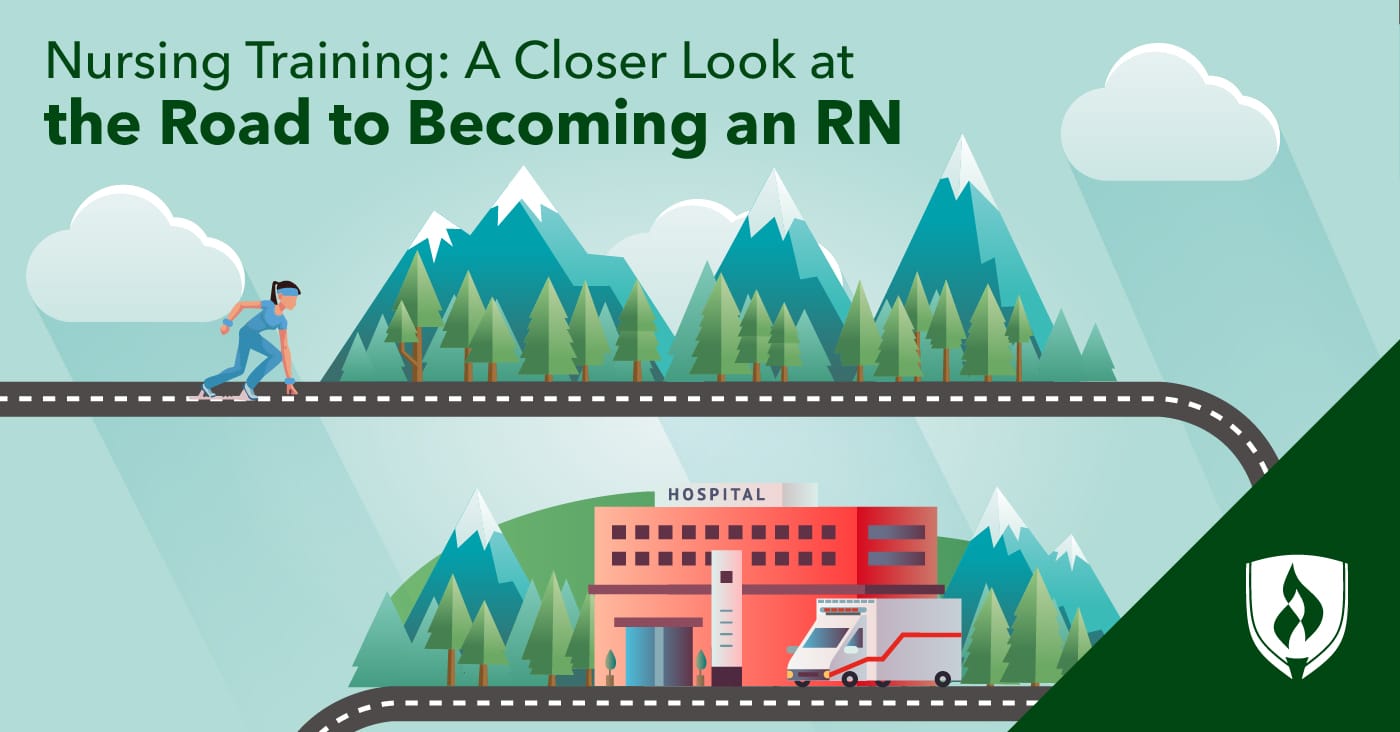
Nursing is such a huge and exciting field. No matter how much you know—there’s always more to learn, and the best nurses approach their careers with that mentality. If you get excited about the prospect of becoming a registered nurse (RN), you might well be wondering what exactly your nursing training will look like.
What kind of courses will you take? How long will you be in school? Is a Nursing school much different than other college programs? Sometimes being able to picture the journey up close can help you make important decisions. If you are curious about nursing training, read on and get a closer look at the road to becoming an RN.
Get Your Nursing School Questions Answered at a Nursing Information Session
Nursing training: Programs and courses
No matter which path you choose for a degree in Nursing, your core curriculum will include courses on a variety of essential nursing topics. Nurses need to know about quality and safety assurance in nursing, for example—and they also need to know how to administer IV fluids. This mixture of both theoretical and practical knowledge makes nursing training a little more interesting than your average college program.
Whether you pursue an Associate’s degree in Nursing (ADN) or a Bachelor of Science in Nursing (BSN), you will have to pass the NCLEX-RN exam. Nursing programs of any kind need to teach students the fundamental material they need to pass that test.
After that, the courses you take in a Nursing program will vary depending on the path you choose. Let’s take a closer look at two popular options.
The Associate’s Degree in Nursing route
The Associate’s degree in Nursing (ADN) is the shortest path to working as an RN. It appeals to students who want the minimum credential they need to start working as an RN as quickly as possible. ADN programs from career-focused colleges can be completed in as few as 18–24 months.* The ADN route is a great option for those who many not be able to commit to the time and financial investment a BSN requires.
These programs will have a blend of general education (math, language, social science) and Nursing courses. This ensures Nursing students have a well-rounded education while still providing an in-depth understanding of how to complete important nursing duties.
This foundation of hands-on nursing knowledge gives ADN nurses the ability to complete a BSN program online if they do decide to return and pursue a Bachelor’s degree later on.
Specific Nursing training courses for the ADN
Rasmussen University's Associate’s degree in Nursing program includes Nutritional Principles in Nursing, a course that introduces students to chemical processes that occur on a cellular level related to nutrient intake. Emphasis is placed on the body’s ability to meet basic health and wellness needs as it pertains to a diverse set of clients across the lifespan.
Another important course is Professional Nursing 1, the first of a two-course series that teaches students to build a skill set to meet health needs and exercise clinical judgment as a nurse. This class involves theory, lab and clinical components. Students must demonstrate their proficiency in all knowledge, skills and attitudes needed to provide safe, quality care to complete the course.
Other ADN courses at Rasmussen University include Mental Health Nursing, Pharmacology and Nursing Assessment.
For a complete list of ADN courses and descriptions, check out the Professional Nursing course listing page.
The Bachelor of Science in Nursing route
The Bachelor of Science in Nursing degree program is designed to offer a well-rounded approach to nursing, giving students a closer look at many different areas and specializations—as well as a high-level education in critical thinking and healthcare as an industry. This degree typically takes four years to complete.*
The BSN is becoming more and more popular as hospitals and other healthcare systems have been pushing for more nurses to have Bachelor’s degrees. This route is great for nurses who know they want to work in a hospital or who have plans to advance in their career through leadership or specialization opportunities.
As far as nursing training goes, these programs offer a fully rounded general education, along with a more comprehensive Nursing curriculum.
Specific Nursing training courses for the BSN
One course you’ll find in the Rasmussen School of Nursing BSN is the Nursing Ethics and Legal Issues—a class that teaches students to investigate ethical and legal concepts and the ethical/legal/moral dilemmas that may occur in the course of delivering safe, competent and compassionate healthcare. Students will evaluate scenarios and prepare approaches to contend with these issues in their workplace.
A course like Introduction to Alternative and Complementary Therapies allows students to look at nursing through different approaches in healthcare while examining safety issues, evidence-based healthcare and the various types of complementary and alternative therapies.
Then you have classes like Transcultural Nursing to learn the importance of recognizing and incorporating the cultural beliefs and experience of patients, families and their healthcare professionals with care settings. Topics include comparative analysis of communication styles, fostering open communication, family roles, dietary preferences, safety and concerns associated with cultural beliefs, values and practices of cultural norms.
Other courses will prepare BSN nurses to translate healthcare research evidence into their nursing practices and give a deeper look into different nursing specialties and potential workplaces—such as community health, acute care, pediatrics and chronic care.
For a more complete listing of BSN classes and their descriptions, check out the Accelerated BSN Standard Entrance option course listing page.
If you’re still feeling unsure about which nursing degree path you want to take, our article, “ADN vs. BSN: Your Guide to Help You Decide on a Nursing Degree,” can help.
Nursing training: Clinicals
Nurses are lifelong learners. Thriving in the healthcare industry means gaining skill and knowledge as you go and adapting to changes in best practices, technology and health research. And the education aspiring nurses need most is hands-on. Once you start doing the things you’ve been learning about—the training kicks up a notch. This is what nursing clinicals are for.
Students who are working to become registered nurses (RNs) must complete a certain number of clinical hours (specified by state) before they can take the NCLEX. The clinical experience will vary somewhat, depending on the setting you’re working in, but the overall goal is the same—to ensure student nurses are up to speed and able to safely practice everyday nursing duties in a real setting. This is the time for student nurses to apply what they’ve learned and get comfortable handling the healthcare variables that may not arise in textbook scenarios.
Want to learn more? Check out our article, “7 Expert Tips for Getting the Most Out of Nursing School Clinicals,” for advice on what to expect and how to maximize your clinical learning experience.
Start your nursing training
As you can see, nursing training involves a lot of information! You might be feeling overwhelmed just reading about all the things new nurses need to learn. But don’t let that hold you back—even the world’s greatest nurses had to start at square one at some point. Your Nursing program will take you from there and teach you everything you need to thrive as a nurse.
If you’re seriously considering becoming a nurse, your first step is getting into Nursing school. If you could use some tips on how to get started, check out our article, “How to Get into Nursing School: Your Step-by-Step Guide.”
Related Articles:
- Becoming a Nurse: Why an Associate's Degree in Nursing Is Right for You
- On the Frontlines of the Mental Health Crisis: What is the Role of RNs?
*Completion time is dependent on the number of transfer credits accepted and courses completed each term.




